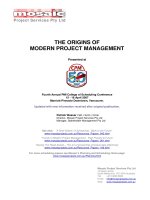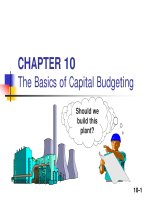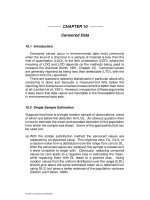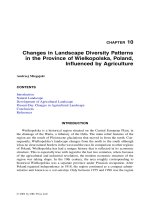Lecture Modern project management: Chapter 10 - Norman R. Howes
Bạn đang xem bản rút gọn của tài liệu. Xem và tải ngay bản đầy đủ của tài liệu tại đây (535.77 KB, 20 trang )
Chapter 11
Managing
Project Teams
McGrawHill/Irwin
© 2008 The McGrawHill Companies, All Rights Reserved
11-2
High-Performing Teams
Synergy
1 + 1 + 1 =10 (positive synergy)
1 + 1 + 1 =2 (negative synergy)
Characteristics of High-Performing Teams
Share a sense of common purpose
Make effective use of individual talents and expertise
Have balanced and shared roles
Maintain a problem solving focus
Accept differences of opinion and expression
Encourage risk taking and creativity
Sets high personal performance standards
Identify with the team
11-3
The Five-Stage Team
Development Model
FIGURE 11.1
11-4
Conditions Favorable to the Development
of High Performance Project Teams
Ten or fewer team
members
Members report only to
the project manager
Voluntary team
membership
Continuous service on
the team
All relevant functional
areas are represented on
the team
Full-time assignment to
the team
The project has a
compelling objective
Members are in speaking
distance of each other
An organization culture of
cooperation and trust
11-5
The Punctuated Equilibrium Model
of Group Development
FIGURE 11.2
11-6
Creating a High-Performance
Project Team
FIGURE 11.3
11-7
Building High-Performance Project Teams
Recruiting Project Members
Factors affecting recruiting:
o Importance of the project
o Management structure used to complete the project
How to recruit?
o Ask for volunteers
Who to recruit?
o
o
o
o
o
o
Problem-solving ability
Availability
Technological expertise
Credibility
Political connections
Ambition, initiative, and energy
11-8
Project Team Meetings
Managing
Managing
Subsequent
Subsequent
Meetings
Meetings
Relationship
Relationship
Decisions
Decisions
Managing
Managing
Change
Change
Decisions
Decisions
Establishing
Establishing
Ground
GroundRules
Rules
Conducting
Conducting
Project
Project
Meetings
Meetings
Planning
Planning
Decisions
Decisions
Tracking
Tracking
Decisions
Decisions
11-9
Establishing a Team Identity
Effective
EffectiveUse
Use
of
ofMeetings
Meetings
Co-location
Co-locationof
of
team
teammembers
members
Creation
Creationof
ofproject
project
team
teamname
name
Team
Teamrituals
rituals
11-10
Requirements for an Effective
Shared Vision
FIGURE 11.4
11-11
Managing Project Reward Systems
Group Rewards
Who
gets what as an individual reward?
How
to make the reward have lasting
significance?
How
to recognize individual performance?
o Letters of commendation
o Public recognition for outstanding work
o Desirable job assignments
o Increased personal flexibility
11-12
Orchestrating the DecisionMaking Process
Problem Identification
Generating Alternatives
Reaching a Decision
Follow-up
11-13
Managing Conflict within the Project Team
Encouraging Functional Conflict
Encourage
dissent by asking tough questions.
Bring in people with different points of view.
Designate someone to be a devil’s advocate.
Ask the team to consider an unthinkable alternative.
Managing Dysfunctional Conflict
Mediate
the conflict.
Arbitrate the conflict.
Control the conflict.
Accept the conflict.
Eliminate the conflict.
11-14
Conflict Intensity Over the
Project Life Cycle
FIGURE 11.5
11-15
Rejuvenating the Project Team
Informal Techniques
Institute new rituals.
Take an off-site break as a team from the project.
View an inspirational message or movie.
Have the project sponsor give a pep talk.
Formal Techniques
Hold a team building session facilitated by an outsider
to clarify ownership issues affecting performance.
Engage in an outside activity that provides an intense
common experience to promote social development
of the team.
11-16
Managing Virtual Project Teams
Challenges:
Developing
trust
o Exchange of social information.
o Set clear roles for each team member.
Developing
effective patterns of communication.
o Include face-to-face if at all possible.
o Keep team members informed on how the overall
project is going.
o Don’t let team members vanish.
o Establish a code of conduct to avoid delays.
o Establish clear norms and protocols for surfacing
assumptions and conflicts.
o Share the pain in terms of multiple time zones.
11-17
24-Hour
Global
Clock
FIGURE 11.6
11-18
Project Team Pitfalls
Groupthink
Groupthink
Bureaucratic
Bureaucratic
Bypass
BypassSyndrome
Syndrome
Going
GoingNative
Native
Team
TeamSpirit
SpiritBecomes
Becomes
Team
TeamInfatuation
Infatuation
11-19
Key Terms
Brainstorming
Dysfunctional conflict
Functional conflict
Groupthink
Nominal group technique (NGT)
Positive synergy
Project kickoff meeting
Project vision
Team building
Team rituals
Virtual project team
11-20









